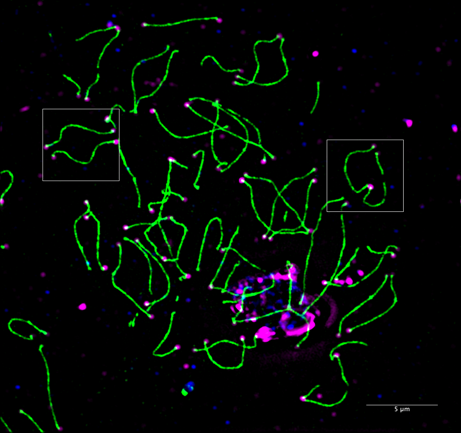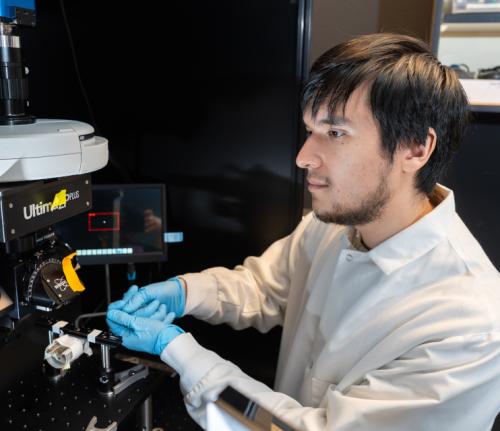Frequently Asked Questions about PREP@UCD

Program basics
What research areas does PREP@UCD include?
- Basic biomedical science, broadly speaking. For specifics, see our listing of faculty trainers. See also the question about lab placement under "structure" below.
What are program dates?
- Each year, PREP@UCD runs from 1 July through 30 June of the next year.
I’m interested in med school. Will your program prepare me for MCATs and interviews?
- No. PREP@UCD prepares students for PhD programs in the biomedical sciences.
- If you wish to pursue a research postbacc in preparation for an MD, check out the intramural postbac programs at the Bethesda campus of the National Institutes of Health. Be sure to watch the (very friendly and clear) videocast that contains instructions for applying.
What about joint degree programs?
- PREP@UCD is poorly suited for dual degree aspirants. See the list in Resources for programs that probably are a better fit.
How big is PREP@UCD?
- We are at our steady state of six scholars per cohort.
How long is the program?
- PREP@UCD is designed and intended to be a one-year program. In (rare) individual cases, a second year might be possible if the mentor, PREP@UCD director, and scholar all agree that an extension would serve a useful purpose.
Structure
How does the program at UC Davis differ from PREP at other sites?
- Each site designs its program to fit the institution, with research that varies depending on the interests of the faculty. It’s up to you to figure out the research, program components, and institutional and community setting that best fit you. You can find other PREP sites at a list of participating institutions.
Does the PREP@UCD curriculum include a GRE preparation course?
- We do not. We encourage our scholars to apply to the 300+ graduate programs that do not require GRE scores (with sincere thanks to Josh Hall, who initiated this list and coordinated the PREP at UNC before departing for a position at HHMI)

How do you place scholars in labs?
- As part of the application process, you indicate up to five faculty whose work interests you. PREP@UCD research labs span the breadth of biomedical sciences within six colleges and professional schools, so you have many options! As part of the admissions process, you will interview via videoconference with a prospective mentor. All faculty selected to be part of PREP@UCD are skilled and experienced mentors, with strong records in guiding undergraduates, postbacc scholars, and new graduate students. Finally, lab placements are a mutual decision between individual scholars and prospective mentors, with input from the Program Director.
I’d like to do clinical research and I found a lab at the UC Davis Medical Center that does really interesting research. Can I work in that lab?
- Clinical and translational research play a critical role in the biomedical sciences, but our program seeks to build foundational research skills. Therefore, we focus on basic biomedical sciences and do not place PREP scholars in translational or clinical labs. All PREP@UC Davis scholars work at labs on the main campus in Davis.
Benefits
Do PREP students live in dorms?
- PREP@UCD scholars will live in the community, i.e., they need to find a rental. The bad news is Davis has a low vacancy rate for apartments. The good news is that everyone always seems to find a place. The other good news is that many graduate students, postdocs, and young working professionals go in together on rentals. You’ll get suggestions about finding housing if admitted to the program.
What are the health benefits?
- PREP@UCD scholars are university employees and get the same benefits as any other employee who works more than 50%. That means medical, dental, and vision care, plus other optional benefits. An employee-focused mental health program staffed by licensed clinicians also provides support for short-term needs and referrals to external providers as appropriate.
What am I responsible for paying for?
- A contribution to health insurance, which depends on the plan that you select, and taxes (FICA, state, and federal taxes are withheld). If you drive your car to campus, you will need to purchase a parking permit.
Eligibility

I did a research internship at UC Davis/I graduated from UC Davis. Can I apply to PREP@UCD?
- Yes, we are happy to receive applications from students who have prior connections to UC Davis. However, to increase their breadth in biomedical research, students with UC Davis research experience who are admitted to PREP@UCD will be placed in labs other than ones in which they did undergraduate research.
I’m not a UC Davis student. Can I apply to PREP@UCD?
- Of course, provided you meet the eligibility criteria specified by the NIH.
What are the criteria for eligibility?
- PREP scholars must be US citizens, nationals, or permanent residents.
- For information on GPA and disciplinary criteria, please see our applications page.
I’m a DACA recipient. Am I eligible for your PREP?
- NIH funding requires that PREP scholars be US citizens or permanent residents. We do not have institutional funding that allows us to support a DACA recipient or student who qualifies for AB540. Please check our Resources page for a (partial) list of sites that can support DACA recipients.
What’s next?
Do I email my application to you?
- No, you need to submit it through the UC Recruit web page. See prep.ucdavis.edu/apply for details.
The recruit page only allows one upload for each document required. I have two transcripts. What should I do?
- Go to a website like https://download.cnet.com, search for software that allows you to edit .pdfs, and concatenate your transcripts.
It’s March and I just learned about your cool program! Can I still apply?
- Applications will continue to be accepted, but those received after 15 February will only be considered if positions have not yet been filled.
Sooo….what can I do if I’m not admitted to PREP@UCD?
- apply to other postbacc programs, posthaste. See the list in Resources.
- apply to a master’s program. Master’s programs come in two main flavors: coursework + thesis, and coursework only. Either way, you gain experience and knowledge. If you apply to universities that offer only the MS (e.g., campuses of the California State University system, such as SF State), you will be first in line for TA and RAships, whereas at many universities that offer both graduate degrees, doctoral students have higher priority for financial support. Other institutions with a large master’s program may fund both master’s and doctoral students, e.g, Delaware State. Our resources page includes a link to a list of funded MS programs (thanks to Stacy Farina from Howard University for developing this list).
- search for bridge programs like this one or the NIH-funded ones listed here…and there are others out there too.
- volunteer in the lab of a faculty member — perhaps a former research mentor? If you can swing the finances, this can work: we know of a student who volunteered part time in a faculty lab for three months, got a paid position in that lab after that, and was admitted to a PhD program later that year.
- search for other options at www.pathwaystoscience.org
I have a question not addressed here.
- Please email us — see below for contact info. We’re happy to help you with specifics.
